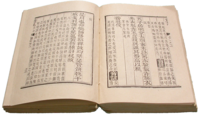
Photo from wikipedia
To the enlivened consciousness history reveals itself as tragedy – and more so the history of the West. In tragedy, the protagonist typically must act without having the knowledge needed.… Click to show full abstract
To the enlivened consciousness history reveals itself as tragedy – and more so the history of the West. In tragedy, the protagonist typically must act without having the knowledge needed. Rather than knowing first and then acting, when matters are clear and the circumstances have been uncovered, the protagonist is impelled first to act, for knowledge, as Aeschylus puts it, is obtained through ‘suffering.’ There is an intellectual sort of knowledge that can be obtained without passion – but history does not wait. Social, political and economic circumstances will not wait, and they force us into action, as they force to act those who are history’s main agents: those in power and those who singularly or collectively command. In normal periods – periods lived as the unfolding and development of planned reforms, periods when people live off beliefs providing (relative, of course) stability; in normal periods, governed by principles recognized, agreed, and to a degree proven and validated – in such periods history will show itself as relatively transparent. Events can be foreseen, and one has the impression that nothing unforeseen can occur. The Man of State is a bit like the mathematician who works through an equation, or who deduces consequences. All danger seems dispelled. Such conditions might, for example, be said to obtain in Europe from the second half of the seventeenth century until the second third of the eighteenth, the Enlightened age in which thinking men and those in command held the structure of society and political life to be transparent. Another such moment is the one in which liberalism seemed achieved – from the end of the nineteenth century to the advent of the First World War. And more remotely, during the so-called Pax Augusta of the Roman Empire. History had calmed, it seemed, and seemed to flow with the settled rhythm of human breath: as if synchronized at last with man. Though not with all men, and still not to this day. Under these clear patches masses gather – groups shorn of breath, masses that drown outside the magic circle that civilization draws. Happy history ends with the intrusion of these peoples, these masses, who had suffered history without being its agents, without being its protagonists. The knowledge on which action was based shows itself, then, to be illusory, or too narrow, too limited. There has not been, until today, any period in the civilizations we know in which knowledge has been sufficient, or in which the circle of clarity in which thought moved coincided with reality. When the catastrophe arrives – then, and only then, is there knowledge. It is a tragic knowledge, then, which comes to and for those who have been able to suffer lucidly. There is another way in which history appears as a tragedy – an authorless tragedy. We have just gestured toward it; it is the difference between individual human life, and the time of history. If history can be understood by making it happen, and also by bearing it lucidly, still the time this takes is
Journal Title: History of European Ideas
Year Published: 2018
Link to full text (if available)
Share on Social Media: Sign Up to like & get
recommendations!